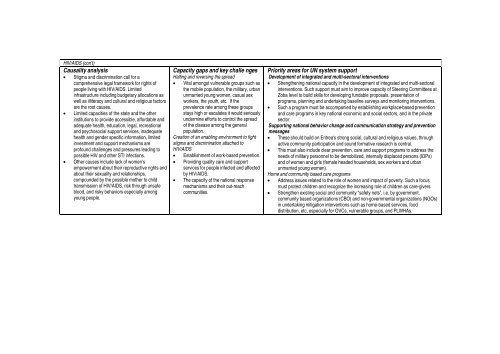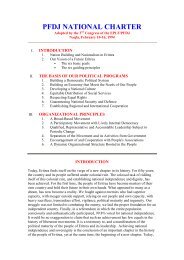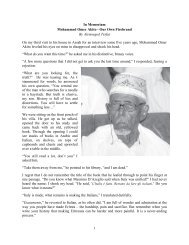Common Country Assessment (CCA) - ECSS | Eritrean Center for ...
Common Country Assessment (CCA) - ECSS | Eritrean Center for ...
Common Country Assessment (CCA) - ECSS | Eritrean Center for ...
You also want an ePaper? Increase the reach of your titles
YUMPU automatically turns print PDFs into web optimized ePapers that Google loves.
HIV/AIDS (con’t)<br />
Causality analysis<br />
• Stigma and discrimination call <strong>for</strong> a<br />
comprehensive legal framework <strong>for</strong> rights of<br />
people living with HIV/AIDS. Limited<br />
infrastructure including budgetary allocations as<br />
well as illiteracy and cultural and religious factors<br />
are the root causes.<br />
• Limited capacities of the state and the other<br />
institutions to provide accessible, af<strong>for</strong>dable and<br />
adequate health, education, legal, recreational<br />
and psychosocial support services, inadequate<br />
health and gender specific in<strong>for</strong>mation, limited<br />
investment and support mechanisms are<br />
profound challenges and pressures leading to<br />
possible HIV and other STI infections.<br />
• Other causes include lack of women’s<br />
empowerment about their reproductive rights and<br />
about their sexuality and relationships,<br />
compounded by the possible mother to child<br />
transmission of HIV/AIDS, risk through unsafe<br />
blood, and risky behaviors especially among<br />
young people.<br />
Capacity gaps and key challe nges<br />
Halting and reversing the spread<br />
• Vital amongst vulnerable groups such as<br />
the mobile population, the military, urban<br />
unmarried young women, casual sex<br />
workers, the youth, etc. If the<br />
prevalence rate among these groups<br />
stays high or escalates it would seriously<br />
undermine ef<strong>for</strong>ts to control the spread<br />
of the disease among the general<br />
population.<br />
Creation of an enabling environment to fight<br />
stigma and discrimination attached to<br />
HIV/AIDS<br />
• Establishment of work-based prevention.<br />
• Providing quality care and support<br />
services <strong>for</strong> people infected and affected<br />
by HIV/AIDS.<br />
• The capacity of the national response<br />
mechanisms and their out-reach<br />
communities.<br />
Priority areas <strong>for</strong> UN system support<br />
Development of integrated and multi-sectoral interventions<br />
• Strengthening national capacity in the development of integrated and multi-sectoral<br />
interventions. Such support must aim to improve capacity of Steering Committees at<br />
Zoba level to build skills <strong>for</strong> developing fundable proposals, presentation of<br />
programs, planning and undertaking baseline surveys and monitoring interventions.<br />
• Such a program must be accompanied by establishing workplace-based prevention<br />
and care programs in key national economic and social sectors, and in the private<br />
sector<br />
Supporting national behavior change and communication strategy and prevention<br />
messages<br />
• These should build on Eritrea's strong social, cultural and religious values, through<br />
active community participation and sound <strong>for</strong>mative research is central.<br />
• This must also include clear prevention, care and support programs to address the<br />
needs of military personnel to be demobilized, internally displaced persons (IDPs)<br />
and of women and girls (female headed households, sex workers and urban<br />
unmarried young women).<br />
Home and community based care programs<br />
• Address issues related to the role of women and impact of poverty. Such a focus<br />
must protect children and recognize the increasing role of children as care-givers.<br />
• Strengthen existing social and community “safety nets”, i.e. by government,<br />
community based organizations (CBO) and non-governmental organizations (NGOs)<br />
in undertaking mitigation interventions such as home-based services, food<br />
distribution, etc, especially <strong>for</strong> OVCs, vulnerable groups, and PLWHAs.





